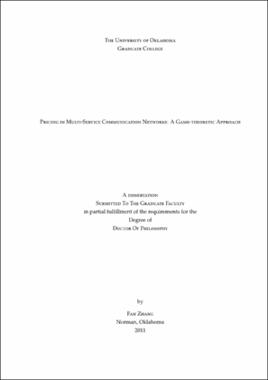| dc.contributor.advisor | Verma, Pramode K. | |
| dc.creator | Zhang, Fan | |
| dc.date.accessioned | 2019-04-27T21:32:12Z | |
| dc.date.available | 2019-04-27T21:32:12Z | |
| dc.date.issued | 2011 | |
| dc.identifier | 99278400402042 | |
| dc.identifier.uri | https://hdl.handle.net/11244/318941 | |
| dc.description.abstract | The promise of multi-class communication networks is gradually becoming a reality. The term multi-class means that the network provides different classes of service that can support diverse application requirements and heterogeneous users demand. This dissertation focuses on establishing an equitable price for each class of service in multi-class networks, considering fairness among the classes and economic efficiency. We adopt a game-theoretic approach to the problem in order to take into account the interdependence among users' service choices. | |
| dc.description.abstract | We investigate subsidy-free prices for each class of service under two distinct service architectures: in multi-class priority-based networks, traffic from each class is assigned priority level in the queue; in multi-class DiffServ networks, network resource is allocated to each class. In both cases, classes of traffic having longer average waiting time receive monetary compensations from other classes and the subsidy-free price for each class of service is developed based on inter-class compensations. This work provides a framework to set subsidy-free price or sustainable price for each class of service which is assumed crucial to network providers if they are to survive the competition in the market place. | |
| dc.description.abstract | We further consider market-clearing prices for each class of service in a competitive market in which each user endowed with an initial budget will purchase bandwidth from each class of the network resource to maximize his or her utility function. A competitive equilibrium is reached when the total bandwidth is allocated, each user spends all his or her budget, and the utility functions are independently and simultaneously maximized. Our research shows that such equilibrium always exists and, under fixed bandwidth supply for each class of service, the equilibrium is also unique. Furthermore, we discuss how to adjust the initial endowment of each user to meet his or her individual bandwidth constraint, either from constraint on the access network or from the limitation of the user equipment. Under this bandwidth constraint condition, the proposed competitive equilibrium yields the price for each class of service, the budget redistribution and the bandwidth allocation among all users. We also develop an iterative algorithm for budget allocation to satisfy each user's bandwidth constraint. The presented competitive market model provides a solution for pricing a multi-class network and allocating network resource among users. And we find this solution achieves higher social utilization, better individual satisfaction and the QoS of each class. | |
| dc.description.abstract | Another advanced topic in communication networks is net neutrality, which has become the subject of fierce debate among the stakeholders of public telecommunication services. Broadband access providers argue that preservation of the integrity of the network services requires them to use discriminatory traffic management practices to slow down certain applications or to purge certain packets that would compromise the integrity of the network. We propose a solution based on the idea of inter-user compensations that could control network congestion and yet maintain fairness among heavy and light users without violating net neutrality. Users consuming less network resource will receive compensations from heavy users. Our research provides a method for broadband access providers to shape the traffic characteristics of users and thus controlling network congestion and maintaining network performance without inflicting discriminatory treatment on network traffic. | |
| dc.format.extent | 130 pages | |
| dc.format.medium | application.pdf | |
| dc.language | en_US | |
| dc.relation.requires | Adobe Acrobat Reader | |
| dc.subject | Computer networks | |
| dc.subject | Game theory | |
| dc.title | Pricing in Multi-Service Communication Networks: A Game-theoretic Approach | |
| dc.type | text | |
| dc.type | document | |
| dc.thesis.degree | Ph.D. | |
| ou.group | College of Engineering::School of Electrical and Computer Engineering | |
